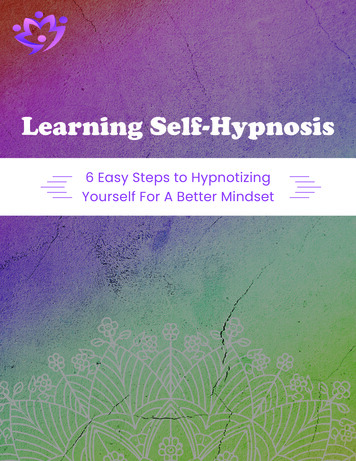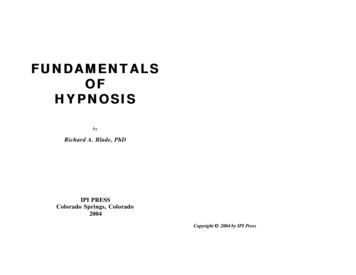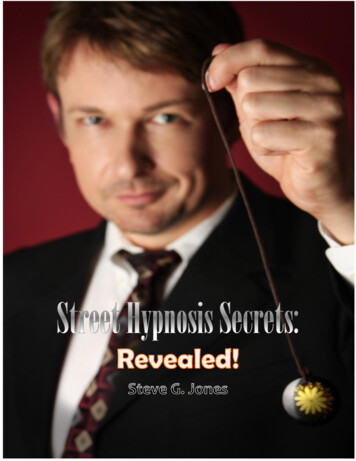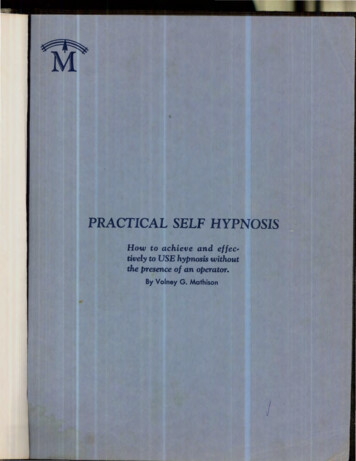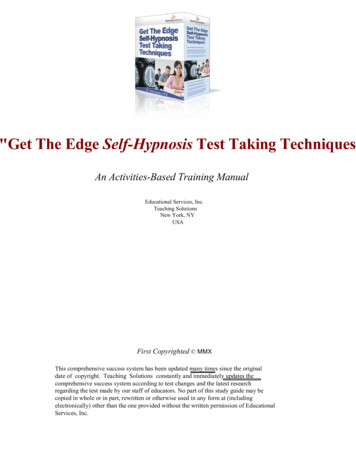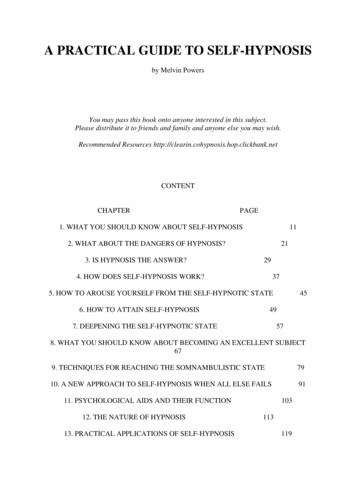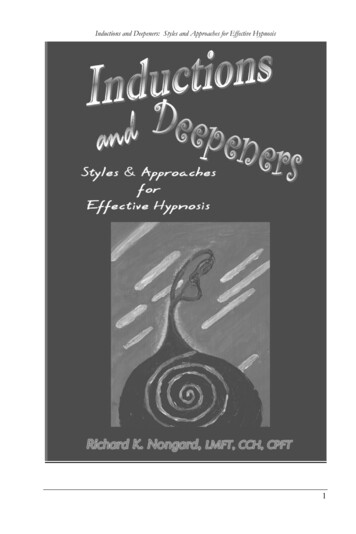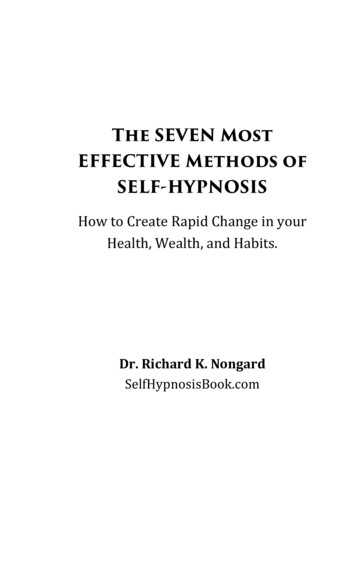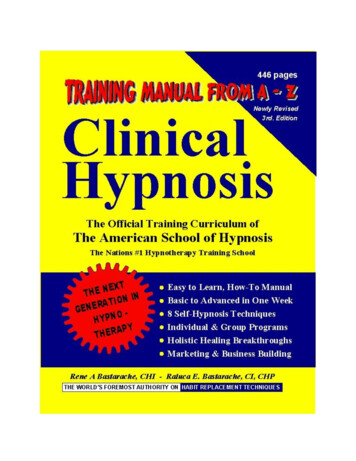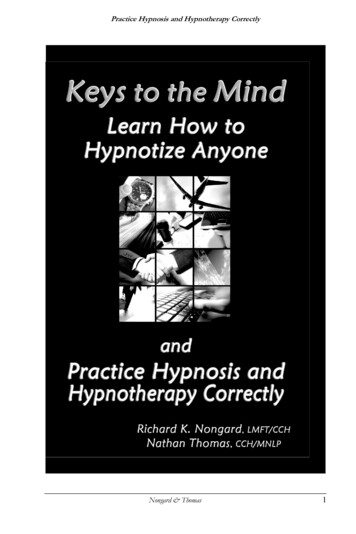
Transcription
ARC Journal of Nursing and HealthcareVolume 4, Issue 1, 2018, PP 28-32ISSN No. (Online) 2455-4324DOI: cjournals.orgThe Effect of Self-Hypnosis on Exam Anxiety and Stress AmongUniversity StudentsMelike DEMİR DOĞANa,* , BSc., MSc, PhD, Burak Çağrı AĞÇAYb , BSc, Tuğba GÖKÇEb ,BScaAssist. Prof , Gümüşhane University, Faculty of Health Sciences, Gümüşhane, TurkeybGümüşhane University, Faculty of Health Sciences, Gümüşhane, Turkey*Corresponding Author: Melike DEMİR DOGAN, Assistant Professor, Gümüşhane University, Facultyof Health Sciences, Gümüşhane, Turkey. Email: melekdm@gmail.comAbstractObjectives: The aim of this study was to determine the effect of self-hypnosis on stress and exam anxietyamong university students. University students experience stress during their education life and the studieshave reported that there is a higher prevalence of stress in students studying in the health-related branchesthan the general population. Several studies have shown that self-hypnosis reduces anxiety and stress.Methods: The sample consisted of 33 students who agreed to participate in the study. The initial assessmentwas made five days before the exam. The students listened to a suggestion set once a day for five days. Andthen, they were re-evaluated in terms of stress and anxiety levels before taking the exam. The data of the studywere collected by using a personal information form, Visual Analogue Scale (VAS) for stress scoring, and theBeck Anxiety Inventory.Results: The average age of the students was 21.97 0.91 (min 20, max 24). While 78.8% of the studentsreported that they had an anxious personality, 78.8% stated to have the exam stress. VAS stress scores of thestudents decreased after the self-hypnosis (p 0.0001). Their mean score of Beck Anxiety Inventory was35.18 9.31 before the self-hypnosis, and their mean score was 28.12 5.66 in final assessment. The anxietylevels of the students decreased after the self-hypnosis (p 0.0001).Conclusion: The present study showed that self-hypnosis decreased anxiety and stress levels. However, it isrecommended to conduct further studies to determine the effect of self-hypnosis on anxiety and stress and usea larger sample in future studies in order to obtain certain evidences.Keywords: Self-hypnosis, Exam Stress, Anxiety, Nursing Student1. INTRODUCTIONSeveral physical and emotional problemsincluding dissatisfaction with one’s self, severeanxiety, and depression may be associated withstress.1,2 University students experience stressduring their education life and the studies havereported that there is a higher prevalence ofstress in students studying in the health-relatedbranches than the general population.3,4One of the stressors is a lowered academicperformance for university students.5 Anxietycommonly increases during exam time even instudents without test anxiety.6 Developingduring childhood, the exam anxiety increases itseffect in future years. The studies have reportedthat exam anxiety is associated with increasednegative, off-task self-dialogue which thenARC Journal of Nursing and Healthcareresults in diminished cognitive performance.7Nursing students suffer from stress in personalrelationships, academic performances, andfinance, which are the same as the all students’stress experience.8 Thus, increasing stress mayresult in decreased academic performance andso, exam anxiety may occur.The word of hypnosis means sleep, but it is notsleep. It is a natural state which ensures apowerful mind training, deep relaxation, andaccelerated learning opportunities.9 Generally, itis known as a method used by one person tohypnotise another, but people can do selfhypnosis, as well. A person can use selfhypnosis through a guide of hypnotic inductionprocedure.10 Self-hypnosis techniques allowpeople to become both self-sufficient andconfident.11 Self-hypnosis can be performed inPage 28
The Effect of Self-Hypnosis on Exam Anxiety and Stress Among University Studentsorder to facilitate concentration and imaginationwith opened or closed eyes.12 Previouslyprepared CDs can be also used as a guide inself-hypnosis. Generally, subliminal suggestionsare involved in the CDs in order to reducepeople's anxiety and stress.Some studies have revealed that self-hypnosis isan effective approach for reducing insomnia12,labour pain10, depression13, anxiety, andstress.14,15 These results are compatible with thepresent study, which was aimed to determine theeffect of self-hypnosis on exam stress in nursingstudents at a university located in the Black Searegion of Turkey.2. METHODS2.1. Design and Sample of the StudyThis non-randomised prospective observationalstudy was conducted at a university located inthe Black Sea region of Turkey betweenDecember 2014 and February 2015. Thepopulation of this study consisted of fourth-yearstudents studying in the nursing department (n 82). 34 students voluntarily participated in thestudy without using randomization. Theinclusion criteria of the study were determinedas follows; having exam stress and being willingto participate in the study. A student whosuffered from the panic attack was not includedin the study even though she was voluntary toparticipate in the study.2.2. Research Instrument and ProcedureThe initial assessment was conducted five daysbefore the exam. In the initial assessment, apersonal information form was filled and whilestress levels of the students were determinedusing Visual Analogue Scale (VAS) for stress,their anxiety levels were determined using BeckAnxiety Inventory16,17. Afterwards, the studentswere showed how to perform the self-hypnosisthrough an mp3, and we performed the firstapplication with the student who participated inthe study.The students listened to an mp3 involving thesuggestion 'you will relax more when you hearyour name' once a day for five days. Whetheror not the participant was listening to MP3every day was asked by the researchersThe instructions given in the mp3 of selfhypnosis on the background with suitable voiceswere as follows: 'Are you ready? Now go to aplace where you will feel very comfortable andnone will disturb you. Sit on a chair with aARC Journal of Nursing and Healthcareheadrest. Close your eyes. Now, we are startingour journey. In a moment you will feel veryslacked and relaxed. During the session, allkinds of noise you hear from the outside and thestreet, music sound and bus sound will makeyou relaxed twice than before. Any noisecoming from inside, kitchen, apartment to yourear during the session will take you to a deeperlooseness twice than before. Every word youhear during the session and the gaps between thewords will lead you to a deeper, very deeperrelaxation than before. With every breath youtake, you will find yourself in a deeperrelaxation than before. The relaxation you haveexperienced today will be very beneficial foryou. You will have life joy, life power, and lifeenergy. In a moment, I'll count from 1 to 10 foryou. You will find yourself in each of thenumbers I have held twice as deeper thanbefore. When I say ten, you will be in such adeep looseness that your consciousness will bevery clear, receptive and sensitive to anything Iwill say. Everything I say to you will be true.I'm starting to count. One slacken, two relax,three, four, five, six continue to slacken, seven,eight, nine and ten. You are very relaxed andslacken right now. Now close your eyes andtake a deep sleep. In your dream you have avery nice evening and you are at the top of a tenstepped staircase descending to the beach. Yousee the sea. The sea is blue and clear. It relaxesyou and slackens you. A slight breeze is on yourface. You hear the rhythmic voice of the wavescoming from the sea. You step down and everystep you take slackens you. You are at thebottom. For the next 7 days from now, your loveof life will increase and you will notice thatevery time you hear your name. On the time ofreturning, you can open your eyes when I countfrom one to three. When you open your eyes,you will feel better. One, go back to your room.Two, go back to your chair. Three, you can openyour eyes. Welcome.'In the same class in which the initial assessmentwas made; stress and anxiety levels of thestudents were evaluated 1 hour before the exam.One day before this evaluation, it wasdetermined that the student listened to the MP3for the last time.Ethical ConsiderationsThe required permission was obtained from theadministration of the University located in theBlack Sea region of Turkey. The students wereinformed about the study and their verbalconsent was obtained.Page 29
The Effect of Self-Hypnosis on Exam Anxiety and Stress Among University Students2.3. Data Analysis3.2. Self-hypnosis and StressThe descriptive statistics, means, median,frequencies, and percentages were used toanalyse the socio demographic characteristics ofthe students. The comparisons were made usingthe t test for all the statistical analyses.The mean score obtained by the students fromVAS for stress was 5.27 2.25 (min 1 - max 9)in the initial assessment and their mean scorewas 4.33 1.72 (min 1 - max 8) in finalassessment. Their VAS stress score decreasedafter self-hypnosis (p 0.0001) (Table 2).3. RESULTSTable2. The effect of self-hypnosis on anxiety andstress3.1. Socio-Demographic Characteristics of theStudentsTable 1 shows socio-demographic characteristicof the students. Their average age was21.97 0.91 (min 20, max 24). Only one studentwas male (3%). 81.8% of the students did notany health problem; however 18.2% had someproblems (Irritable bowel syndrome, chronicurticaria, panic attack, anaemia, allergies, orhypotension). 78.8% of the students stated tohave an anxious personality and 78.8% stated tohave the exam stress.Table1. Socio-demographic characteristics of thestudents (n 33)GenderFemaleMaleCurrent residence placeWith familyIn the dormitoryAt home with my friendsLevel of incomeLowModerateHighMother's educationIlliterateLiteratePrimary schoolSecondary school and High schoolUniversityMother's occupationHousewifeWorkerFather's educationIlliteratePrimary schoolSecondary school and High schoolUniversityFather's 315.212.121.212.139.4ARC Journal of Nursing and HealthcareVAS forstressBeckAnxietyInventory x sdPre-testPost-test5.27 2.254.33 1.72 0.000135.18 9.31 0.000128.12 5.66p3.3. Self-hypnosis and AnxietyThe mean score obtained by the students fromBeck Anxiety Inventory was 35.18 9.31 (min23 - max 59) before the self-hypnosis and theiranxiety mean score was 28.12 5.66 (min 21 max 43) after the self-hypnosis. This decreasewas statistically significant (p 0.0001) (Table2).4. DISCUSSIONUniversity students face various stressors duringtheir education life. The students studying in theundergraduate nursing programs stated highlevels of stress and anxiety.18 In studies on selfhypnosis, it was reported that self-hypnosisdecreased stress and anxiety. Thus, this studywas planned to determine the effect of selfhypnosis on exam stress.The present study revealed that self-hypnosisdecreased the students’ levels of exam stress.One of previous studies reported that selfhypnosis significantly reduced stress ratingsduring the exam period.14 A study reported thatself-hypnosis improved the coping mechanismsfor exam stress among medical students.19 Astudy in which a single-group multiple-baselinedesign was used, reported that it decreasedstress levels among the participants.15 Thesestudies showed similar results with the presentstudy.One of the studies, which were conducted onmedical and dental students, showed that selfhypnosis protected them from stress-relatedimmune decrements.20 The study on the effect ofself-hypnosis on anxiety, and depressionreported that self-hypnosis decreased both.13The present study also revealed that selfPage 30
The Effect of Self-Hypnosis on Exam Anxiety and Stress Among University Studentshypnosis decreased anxiety levels before theexam. Further studies should be conducted forcertain evidences.As a result, as observed in studies, there is nocertain evidences; however, it seems that selfhypnosis can be effective in managing anxietyand stress.[6][7]5. LIMITATIONSThe students were informed about the study andtheir verbal consent was obtained. In the study,control group was not used. Therefore, it isrecommended to use the control group in futurestudies. The data consisted of students’ writtenor verbal reports. Since the students studying inGümüşhane University Faculty of HealthSciences Nursing department were included inthe study, the results of the study may not begeneralized to all nursing students in Turkey.[8][9][10]6. CONCLUSIONThe present study showed that self-hypnosisdecreased anxiety and stress levels. However, itis recommended to conduct further studies todetermine the effect of self-hypnosis on anxietyand stress and use a larger sample in futurestudies in order to obtain certain evidences.[11][12]ACKNOWLEDGMENTSWe would like to thank all the nursing studentswho participated in this study.[13]REFERENCES[1][2][3]M.J. Ko, S.J. Yu, Y.G. Kim. The effects ofsolution-focused group counseling on the stressresponse and strategies in the delinquentjuveniles. Journal of Korean Academy ofNursing. 33 (3) (2003) 440–450.J.S. Won, J.H. Kim. Study on ego states in theview of transactional analysis, coping style andhealth states of nursing students. Journal ofEast-WestNursingResearchInstitute2002;7(1): 68–81.Dyrbye LN, Thomas MR, Shanafelt TD.Systematic review of depression, anxiety, andother indicators of psychological distressamong U.S. and Canadian medical students.Acad Med 2006; 81: 354–373.[14][15]Dundas I, Hagtvet KA, Wormnes B, Hauge H.Does self-hypnosis add to the effectiveness of acognitive-behavioral intervention against testanxiety?. Nordic Psychology 2013; 65(3): 224241.Coy B, O’Brien WH, Tabaczynski T, NorthernJ, Carels R. Associations between evaluationanxiety, cognitive interference and performanceon working memory tasks. Applied CognitivePsychology 2011;25(5): 823–832.Burnard P, Rahim HT, Hayes D, Deborah E. Adescriptive study of Bruneian student nurses’perceptions of stress. Nurse Education Today2007; 27: 808-818.Taylor E. Self-Hypnosis and SubliminalTechnology, A How-to Guide for PersonalEmpowerment Tools You Can Use Anywhere!.United States, Hay House 2012, pp. 49Werner A, Uldbjerg N, Zachariae R, Rosen G,Nohr E. Self-hypnosis for coping with labourpain: a randomised controlled trial. BJOG2013;120:346–353.Cyna AM, Andrew MI, McAuliffe GL.Antenatal Self-hypnosis for Labour andChildbirth: A Pilot Study. Anaesth IntensiveCare 2006;34: 464-469.Sulaiman S. The Effectiveness of Self Hypnosisto Overcome Insomnia: A Case Study.International Journal of Psychological Studies2014; 6(1): 45-57.Gruzelier JH. A review of the impact ofhypnosis, relaxation, guided imagery andindividual differences on aspects of immunityand health. Stress 2002; 5: 147–163.Whitehouse WG, Dinges DF, Orne EC, et al.Psychosocial and immune effects of selfhypnosis training for stress managementthroughout the first semester of medical school.Psychosom Med 1996;58: 249–263.Jones-Trebatoski K. A single group multiplebase line design: Clinical hypnosis as atechnique in the reduction of stress on Abstracts International Section A:Humanities and Social Sciences 2011; 71:3913.[4]Compton MT, Carrera J, Frank E. Stress anddepressive symptoms/dysphoria among U.S.medical students: results from a large,nationally representative survey. J Nerv MentDis 2008;196: 891–897[16] Ulusoy M. Beck Anksiyete Envanteri: Geçerlikve güvenirlik çalışması. Yayımlanmamışuzmanlık tezi. Bakırköy Ruh ve SinirHastalıkları Hastanesi, 1999 İstanbul.[17] Nikkhah M, Arefi M. Effectiveness of therapywith respect to acceptance and commitment onstudents' anxiety with test anxious in Esfahancity. Journal of Scientific Research andDevelopment 2015; 2(4): 190-194.[5]Shiralkar M, Harris T, Eddins-Folensbee F,Coverdale J. A Systematic Review of StressManagement Programs for Medical Students.Academic Psychiatry 2013; 37:158–164.[18] Linda M. Interventional Strategies to DecreaseNursing Student Anxiety in the ClinicalLearning Environment. Journal of NursingEducation 2009; 48(1): 17-23.ARC Journal of Nursing and HealthcarePage 31
The Effect of Self-Hypnosis on Exam Anxiety and Stress Among University Students[19] Palan BM, Chandwani S. Coping withexamination stress through hypnosis: anexperimental study. Am J Clin Hypn1989;31(3): 173–180[20] Kiecolt-Glaser JK, Marucha PT, Atkinson C,Glaser R. Hypnosis as a modulator of cellularimmune dysregulation during acute stress.Journal of Consulting and Clinical Psychology2001; 69: 674–682.Citation: Melike DEMİR DOGAN, Burak Çağrı AĞÇAY, Tuğba GÖKÇE. The Effect of Self-Hypnosis onExam Anxiety and Stress Among University Students, ARC Journal of Nursing and Healthcare. 2018; 4(1): 2832. doi: dx.doi.org/ 10.20431/2455-4324.0401004.Copyright: 2018 Authors. This is an open-access article distributed under the terms of the CreativeCommons Attribution License, which permits unrestricted use, distribution, and reproduction in any medium,provided the original author and source are credited.ARC Journal of Nursing and HealthcarePage 32
accelerated learning opportunities.9 Generally, it is known as a method used by one person to hypnotise another, but people can do self-hypnosis, as well. A person can use self-hypnosis through a guide of hypnotic induction procedure.10 Self-hypnosis t
